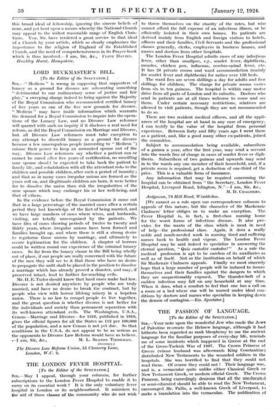LORD BUCKMASTER'S BILL.
[To the Editor of the SPECTATOR.] Medicus " is wrong in supposing that supporters of lunacy as a ground for divorce are advocating something "detrimental to our rudimentary sense of justice and fair play," a sweeping charge indeed to bring against the Majority of the Royal Commission who recommended certified lunacy of five years as one of the five new grounds for divorce. " Medicus " may have inside information which warrants the demand for a Royal Commission to inquire into the opera- tions of the Lunacy Law, and no Divorce Law reformer will quarrel with such an inquiry if it discloses a real need for reform, as did the Royal Commission on Marriage and Divorce, but all Divorce Law reformers must take exception to any attempt to discredit lunacy as a ground for divorce because a few unscrupulous people (according to " Medicus ") misuse their power to keep an unwanted spouse out of the way. Divorce Law reformers say whether a patient can or cannot be cured after five years of certification, no unwilling sane spouse should be expected to take back the patient to family life, and cohabitation with all the attendant risks to the children and possible children, after such a period of insanity ; and that as in many cases irregular unions are formed as the years roll on, and illegitimate children arc born, it were better far to dissolve the union than risk the irregularities of the sane spouse which may endanger his or her well-being, and that of others.
In the evidence before the Royal Commission it came out that in a large percentage of the married cases after a certain period they lost knowledge of the fact of being married, and we have large numbers of cases where wives, and husbands, visiting, are totally unrecognized by the patients. We have files of cases showing periods of twelve to twenty and thirty years, where irregular unions have been formed and families brought up, and where there is still a strong desire to regularize those unions by marriage, and ultimately to secure legitimation for the children. A chapter of horrors could be written round our experience of the criminal lunacy cases. So far from the lunacy clause in the Bill being wholly out of place, if our people are really concerned with the future of the race they will see to it that those who have no desire to propagate the unfit shall be placed in the position to dissolve a marriage which has already proved a disaster, and may, if preserved intact, lead to further far-reaching evils.
Mr. II. E. Tudor should know that hard cases make bad law. Divorce is not desired anywhere by people who are truly married, and have no desire to break the contract, but by people who view with horror lifelong misery in a hopeless union. There is no law to compel people to live together, and the great question is whether divorce is not better for the individuals and society than permanent separation with its well-known attendant evils. The Washington, U.S.A., Census—Marriage and Divorce—for 1916, published in 1919, gives the official figures for all the States as 112 per 100,000 of the population, and a new Census is not yet due. So that conditions in the U.S.A. do not appear to be as serious as the opponents to Divorce Law Reform would have us believe.
(Secretary.)
The Divorce Law Reform Union, 55 Chancery Lane, London, W.C. 2.






































 Previous page
Previous page